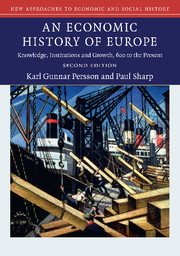Description
An Economic History of Europe (2nd Ed., Revised edition)
Knowledge, Institutions and Growth, 600 to the Present
New Approaches to Economic and Social History Series
Authors: Persson Karl Gunnar, Sharp Paul
The second edition of a leading textbook on European economic history, updated throughout and with new coverage of post-financial crisis Europe.
Language: English
Subject for An Economic History of Europe:
Approximative price 36.43 €
In Print (Delivery period: 14 days).
Add to cart
An Economic History of Europe (2nd Ed.)
Publication date: 03-2015
285 p. · 17.5x24.6 cm · Paperback
Publication date: 03-2015
285 p. · 17.5x24.6 cm · Paperback
Approximative price 87.11 €
In Print (Delivery period: 14 days).
Add to cart
An Economic History of Europe (2nd Ed.)
Publication date: 03-2015
316 p. · 17.9x25.3 cm · Hardback
Publication date: 03-2015
316 p. · 17.9x25.3 cm · Hardback
Description
/li>Contents
/li>Biography
/li>
This revised and extended edition of the leading textbook on European economic history has been updated to take account of contemporary economic developments and the latest research and debates. A concise and accessible introduction that covers the full sweep of the European history, the book focuses on the interplay between the development of institutions and the generation and diffusion of knowledge-based technologies. With simple explanations of key economic principles, the book is an ideal introduction for students in history and economics. Revised textboxes and figures, an extensive glossary, suggestions for further reading and a suite of online resources lead students to a comprehensive understanding of the subject. New material covers contemporary economic developments such as the financial crises of 2007/2008, the Eurozone crisis, new trends in inequality and the austerity debates. This remains the only textbook students need to understand Europe's unique economic development and its global context.
Part I. The Making of Europe; Part II. Europe from Obscurity to Economic Recovery; Part III. Population, Economic Growth and Resource Constraints; Part IV. The Nature and Extent of Economic Growth in the Pre-Industrial Epoch; Part V. Institutions and Growth; Part VI. Knowledge, Technology Transfer and Convergence; Part VII. Money, Credit and Banking; Part VIII. Trade, Tariffs and Growth; Part IX. International Monetary Regimes in History; Part X. The Era of Political Economy - from the Minimal State to the Welfare State in the Twentieth Century; Part XI. Inequality among and within Nations - Past, Present, Future; Part XII. Globalization and its Challenge to Europe.
Karl Gunnar Persson is Emeritus Professor at the Department of Economics, University of Copenhagen and has taught comparative economic history and globalization studies over five decades. He has published widely in the leading economic history journals and was the founding editor of European Review of Economic History. His previous monographs include Pre-Industrial Economic Growth: Social Organization and Technological Progression in Europe (1988) and Grain Markets in Europe, 1500–1900: Integration and Deregulation. Educated in Sweden, he is a member of the Royal Danish Academy of Sciences.
Paul Sharp has been an Associate Professor at the Department of Business and Economics at the University of Southern Denmark since 2012. He completed his PhD in economics at the University of Copenhagen in 2009, after studying at King's College London and the University of Copenhagen. The main focus of his work is on economic and agricultural history and he is currently working on a co-authored book on the early history of the Danish dairy industry. He has published widely in economics, history, and economic history journals.
Paul Sharp has been an Associate Professor at the Department of Business and Economics at the University of Southern Denmark since 2012. He completed his PhD in economics at the University of Copenhagen in 2009, after studying at King's College London and the University of Copenhagen. The main focus of his work is on economic and agricultural history and he is currently working on a co-authored book on the early history of the Danish dairy industry. He has published widely in economics, history, and economic history journals.
© 2024 LAVOISIER S.A.S.
These books may interest you

The Political Economy and Media Coverage of the European Economic CrisisThe case of Ireland 178.41 €

Europe in CrisisBolt from the Blue? 160.25 €


